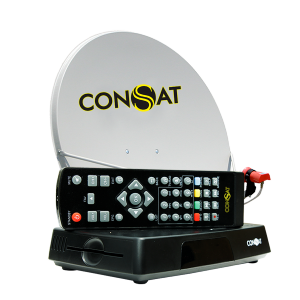
After more than 40 years of operation, DTVE is closing its doors and our website will no longer be updated daily. Thank you for all of your support.
Consat’s Nigerian journey
 Consat’s Addy Awofisayo discusses the DTH operator’s growth to date and its future plans in its competitive home market of Nigeria with Andy McDonald.
Consat’s Addy Awofisayo discusses the DTH operator’s growth to date and its future plans in its competitive home market of Nigeria with Andy McDonald.
Continental Satellite Limited (Consat) was established in 2012 with a mission to provide an affordable and dependable pay TV service to all Nigerians. The Lagos-headquartered, digital satellite television company offers direct-to-home (DTH) entertainment packages that director of content, Addy Awofisayo, says are aimed specifically at the country’s lower- and middle-income earners.
Awofisayo says that since going live over a year ago, Consat has seen “considerable uptake” of its service – even without a “big bang” marketing campaign. Although Awofisayo won’t reveal specific numbers, she says it has “definitely been a little bit more than we anticipated” in a challenging market.
“When we started we were very conservative in terms of our subscriber numbers. Even though people say ‘it’s the Nigerian market, it’s big’, it is also very competitive. When you talk about the market that we’re targeting, which is the lower-income, middle-income class, disposable income is not readily available,” says Awofisayo.
While Consat is targeting a similar customer-base to MultiChoice’s low-cost GOtv service and StarTimes’ Nigerian offering, Awofisayo claims that it has a coverage advantage over digital-terrestrial pay TV rivals. “DTT can only reach certain places. But being DTH we can target pretty much every nook and corner of Nigeria – every village, every town, every city. So we feel like we have something to offer that DTT players don’t have,” she says.
Consat offers two main bouquets of content – its Style Package, priced at NGN999 (€4.40) per month, and its Classic package, which costs NGN3,999 (€17.70) per month.
The Style package has 33 channels including Viacom-owned entertainment network Colors International, Nollywood network TVC Nolly, Hausa-language channel TVC Hausa and MTV India. The Classic package has roughly 55 channels, including international networks MSNBC, Fox Entertainment, Fashion One, FilmBox and Fox Sports. Consat also offers a free-to-view option, with 17 channels including news networks TVC News, France 24 and Al Jazeera, along with the likes of TVC Entertainment and family entertainment channel Royal Roots TV. Viewers who have a Consat set-top box and pay a quarterly administrative fee can access these channels without paying a monthly charge.
Awofisayo does not see Multichoice-owned DStv as a direct competitor “because we are not playing in the same field”. DStv’s packages range in price from NGN6,000 per-month for its Compact package to NGN13,980 for its Premium pack. However, one major draw that DStv has is access to sports, including English Premier League football.
StarTimes, which offers both pay DTH and DTT services in Nigeria, also now offers more sport options to Nigerian viewers after securing a five-year deal to broadcast German Bundesliga football and a three-year deal for Italian Serie A football earlier this year. The operator has two new add-on bouquets – Sports Play and Sports Plus – specially designed for sport enthusiasts on the basic and classic packages on its DTT offering and on the smart package for its DTH offer.
“I know sports, especially the English Premier League is very big in Nigeria. However, I don’t think sports is the only offering that you can give to customers,” says Awofisayo, adding that Consat viewers can still access baseball and rugby, as well as French and Belgian football through the sports channels it does carry – namely Fox Sports and Fox Sports 2. “I think women and kids are really the big consumers of TV in Nigeria, and even probably across other countries too… As long as you have strong offerings in those [areas] and you make sure that those people are well taken care of in your channel offering, I think you’ll be fine.”
Awofisayo believes that Nigeria’s move to digital broadcasting will present opportunities for Consat. Earlier this year Nigeria missed its ITU-mandated, June 17 date for analogue to digital switchover, with the Nigerian National Broadcasting Commission agreeing a new deadline of June 20 2017 in coordination with neighbouring states. When switch-off does come, Awofisayo says “everyone has to have a box in order to watch TV”, putting Consat in a good position to be the chosen provider of “a considerable amount” of the millions of households that will need to make the switch.
Looking ahead, Awofisayo says that, as a DTH service, Consat has the option of moving into neighbouring markets – though its focus is firmly on Nigeria for the time being. “Our footprint covers West, East, Central and Madagascar. We could expand, but I think because Nigeria’s such a big market we definitely want to get that right. It probably will take us two or three years to make sure that we really have our hold on Nigeria.”
In terms of strategy for next year, she says that provided Consat has a strong offering in kids’, women’s and lifestyle channels, “we’re going to be able to keep our subscriber base and even grow it. That’s really our focus: how can we get people connected to our boxes. Our free-to-view offer is another strategy that we hope will get customers connected to us.”